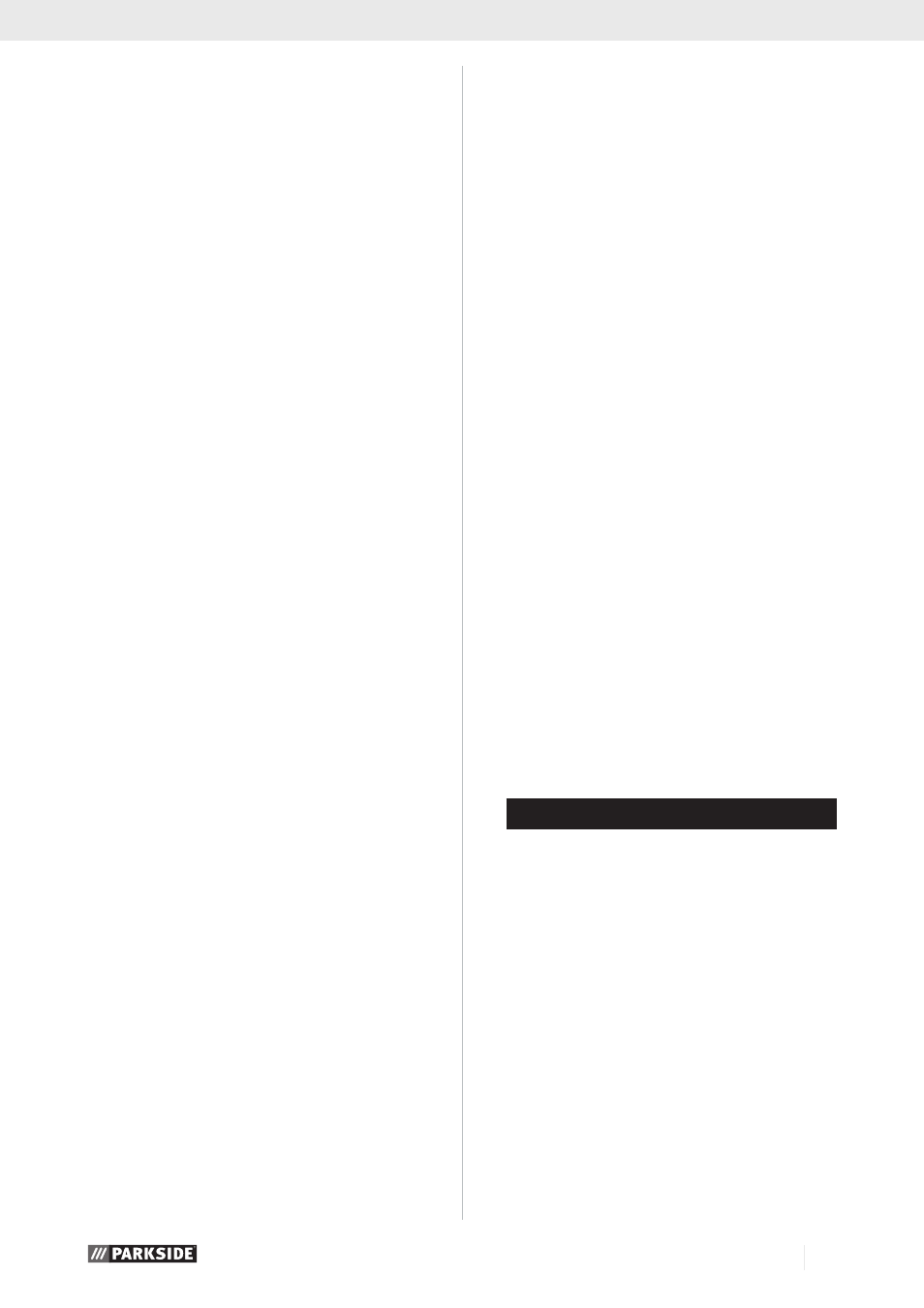Additional safety instructions – Parkside PKS 1500 A1 User Manual
Page 42

37
GB/MT
recommended.
–
Tie long hair back in a hair net.
9
Use protective equipment
–
Wear protective goggles.
–
Wear a mask when carrying out dust-creating
work.
10
Connect the dust extraction device
–
If connections for dust extraction and a collec-
ting device are present, make sure that they are
connected and used properly.
–
Operation in enclosed areas is only permitted
with a suitable extraction system.
11
Do not use the cable for purposes for which it is
not intended
–
Do not use the cable to pull the plug out of the
outlet. Protect the cable from heat, oil and sharp
edges.
12
Secure the workpiece
–
Use the clamping devices or a vice to hold the
workpiece in place. In this manner, it is held
more securely than with your hand.
–
An additional support is necessary for long work-
pieces (table, trestle, etc.) in order to prevent the
machine from tipping over.
–
Always press the workpiece firmly against the
working plate and stop in order to prevent boun-
cing and twisting of the workpiece.
13
Avoid abnormal posture
–
Make sure that you have secure footing and
always maintain your balance.
–
Avoid awkward hand positions in which a sudden
slip could cause one or both hands to come into
contact with the saw blade.
14
Take care of your tools
–
Keep cutting tools sharp and clean in order to be
able to work better and more safely.
–
Follow the instructions for lubrication and for tool
replacement.
–
Check the connection cable of the electric tool
regularly and have it replaced by a recognised
specialist when damaged.
–
Check extension cables regularly and replace
them when damaged.
–
Keep the handle dry, clean and free of oil and
grease.
15
Pull the plug out of the outlet
–
Never remove loose splinters, chips or jammed
wood pieces from the running saw blade.
–
During non-use of the electric tool or prior to
maintenance and when replacing tools such as
saw blades, bits, milling heads.
16
Do not leave a tool key inserted
–
Before switching on, make sure that keys and
adjusting tools are removed.
17
Avoid inadvertent starting
–
Make sure that the switch is switched off when
plugging the plug into an outlet.
18
Use extension cables for outdoors
–
Only use approved and appropriately identified
extension cables for use outdoors.
–
Only use cable reels in the unrolled state.
19
Remain attentive
–
Pay attention to what you are doing. Remain
sensible when working. Do not use the electric
tool when you are distracted.
20
Check the electric tool for potential damage
–
Protective devices and other parts must be care-
fully inspected to ensure that they are fault-free
and function as intended prior to continued use
of the electric tool.
–
Check whether the moving parts function
faultlessly and do not jam or whether parts are
damaged. All parts must be correctly mounted
and all conditions must be fulfilled to ensure
fault-free operation of the electric tool.
–
The moving protective hood may not be fixed in
the open position.
–
Damaged protective devices and parts must be
properly repaired or replaced by a recognised
workshop, insofar as nothing different is speci-
fied in the operating manual.
–
Damaged switches must be replaced at a custo-
mer service workshop.
–
Do not use any faulty or damaged connection
cables.
–
Do not use any electric tool on which the switch
cannot be switched on and off.
21
ATTENTION!
–
Exercise elevated caution for double mitre cuts.
22
ATTENTION!
–
The use of other insertion tools and other acces-
sories can entail a risk of injury.
23
Have your electric tool repaired by a qualified
electrician
–
This electric tool conforms to the applicable
safety regulations. Repairs may only be perfor-
med by an electrician using original spare parts.
Otherwise accidents can occur.
Additional safety instructions
1
Safety precautions
–
Warning! Do not use damaged or deformed saw
blades.
–
Replace a worn table insert.
–
Only use saw blades recommended by the ma-
nufacturer which conform to EN 847-1.
–
Make sure that a suitable saw blade for the ma-
terial to be cut is selected.
–
Wear suitable personal protective equipment.
This includes:
–
Hearing protection to avoid the risk of beco-
ming hearing impaired,
–
Respiratory protection to avoid the risk of
inhaling harmful dust,
–
Wear gloves when handling saw blades and
rough materials. Carry saw blades in a contai-
ner whenever practical.
–
Wear goggles. Sparks generated during work
or splinters, chippings and dust coming from
the device can lead to loss of eyesight.
